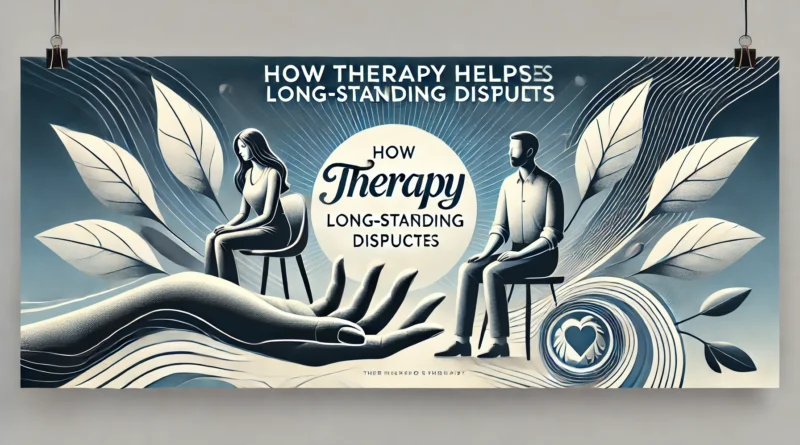How Therapy Helps Couples Overcome Long-Standing Disputes
Conflict is an unavoidable ingredient in any relationship. But when it becomes persistent, at the cost of denting that vital base of trust, love, and understanding, it does seem like a no-way-ahead scenario. The good news? It can also help couples break free from long-standing disputes, re-establish their bond, and develop healthier dynamics.
This blog looks at how therapy works for couples with a burden of unresolved fights. We’ll talk about common misconceptions, the techniques therapists use in this regard, and some actionable benefits of investing in professional help. By the end of it, you’ll know why therapy could be the right next step for both you and your partner.
Why Do Long-Standing Quarrels Happen in Relationships?
Ups and downs are part of every relationship. But more often, quarrels last longer when some issues seem to have never been resolved between the partners. Here’s why long-standing conflicts arise:
1.communication Breakdowns
Miscommunication-or utter lack of it-is among the most prevalent culprits behind ongoing disputes. You feel misunderstood, or your partner does not express the feelings at all. Over time, this develops into a vicious cycle where the same argument is back time and again.
Example: A partner might say, “You never appreciate anything I do,” whereas what they actually mean is, “I don’t feel appreciated, and I need to talk about how we can connect better.”
- Unmet Expectations
Unrealistic or undefined expectations may breed resentment. Perhaps one partner envisioned shared responsibilities like chores or parenting differently. When such expectations are not aligned, they cause tension.
- Past Traumas or Emotional Baggage
Personal histories, such as past relationships or childhood traumas, also play a significant role in how we respond during a conflict. Many couples unconsciously project past traumas into the current relationship, thereby exacerbating existing problems.
- Avoidance of Conflict
It is very tempting to sweep problems under the rug. But avoidance merely delays resolution and builds frustration over time.
Therapy offers couples both the tools and safe space to deal with these root causes. But how does it work?

How Does Couples Therapy Help Resolve Long-Term Disputes?
Therapy isn’t just about airing grievances. It’s a structured, solutions-driven process led by a licensed professional trained to facilitate healing. Here’s how it helps:
- Creating a Safe Space for Open Dialogue
Therapists foster an environment free from judgment or blame. This allows both partners to speak honestly about their experiences and emotions. Feeling heard is the first step toward healing.
Example: The therapist may sum up each partner’s thoughts using reflective listening skills so that both parties will understand each other clearly.
- Identifying Patterns and Triggers
Most couples fall into “negative cycles” where minor interactions lead them to frequent fights. Therapists can point out harmful behavior, such as defensiveness or stonewalling, and guide the partners working their way up to more helpful reactions.
- Teaching Effective Communication Techniques
They resort to nonviolent communication methods or active listening skills to improve their interaction. This approach can prevent them from elevating the conflict between them.
How it works: Avoid accusatory statements like, “You never make time for me,” and instead, state your feelings using “I” statements: “I feel unimportant when our time together is disrupted by work because of you.”
- Rebuilding Trust
For couples who face infidelity, betrayals, or broken promises, therapy teaches the way of reinstatement of trust. The therapeutic process includes forgiving exercises, validation of feelings, and boundary setting in order to let go.
- Meeting Emotional Needs
A very important element in dissolving long-standing disputes is meeting each other’s emotional needs. Therapists help bring these unmet needs to light and redirect the couple toward fulfilling those needs.
Example Question a therapist might ask to explore this further:
- “What’s one thing your partner does that makes you feel most loved, and how can they do it more often?”
- Teaching Conflict-Resolution Strategies
Arguments need not escalate into hurtful confrontations. Therapists help couples learn healthy ways to de-escalate conflicts, set boundaries, and find common ground.
Techniques Include:
- Time-outs during heated discussions
- Setting “rules of engagement” during conflicts, such as not yelling or calling names
- Problem-solving exercises based on compromise
What Are the Benefits of Couples Therapy?
Professional help can level out immediate disputes but also lay the foundation for long-term success in a relationship. Here go the core benefits of couples therapy:
- Improved Communication
Couples learn the ways and means to communicate effectively and reduce misunderstandings.
- Empathy and Understanding
Therapy builds greater empathy since it allows both sides to understand the situation from their partner’s perspective.
- Stronger Emotional Connection
Therapy often renews romance as partners come to understand and address emotional detachers.
- Personal Growth
Each of the partners gains a deeper understanding of themselves-learning how his or her behaviors, values, and beliefs impact the relationship.
- Conflict Prevention
By addressing the very roots of disagreements, couples have the wherewithal to tackle their future problems better.
Whether your marriage has seen years of struggling with one problem after another, or you want to just find a stronger love, therapy has an adaptable process for growth.

FAQs About Couples Therapy, Answered
You might have certain apprehensions or questions before you finally book your first session. We have answered here some of the most frequently asked questions about couples therapy:
- Is couples therapy only for failing relationships?
Not at all. Therapy is not just for troubled couples. It is also an excellent way to further healthy relationships, increase understanding, and prepare for the major transitions that life throws in your way.
- How long does couples therapy usually last?
There is no single answer to that. For some, a few sessions may be enough, but others may need continuous therapy for months.
- What if one partner is resistant to going to therapy?
It is quite common for one partner to be resistant. Openly communicating about why therapy is important to the relationship often helps. Or sometimes, individual therapy can also yield useful insights.
- Does online couples therapy work?
Of course, it is. Online platforms today, like Regain and Better Help, offer private, flexible, and effective virtual therapy options for couples.
- How do I choose the right therapist for my relationship?
Seek out licensed professionals who have experience with couples counseling. Many therapists specialize in one approach, such as Emotionally Focused Therapy (EFT) or the Gottman Method, both of which have been proven to enhance relationships.
A Healthier, Happier Relationship Starts Here
Disagreements don’t have to be the end of your story together. Therapy provides a workable way forward via understanding, communication, and reconnecting techniques. If long-standing disagreements have been troubling you, then now may be a good time to invest in the future of your relationship.
Whether you are embarking on this journey for the first time or have tried other ways, the step to couples therapy is bold. After all, every relationship has its challenges; it is how you work through them together that defines your bond.

